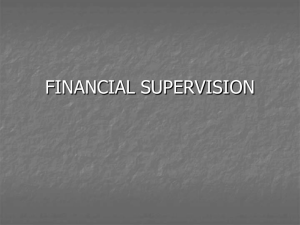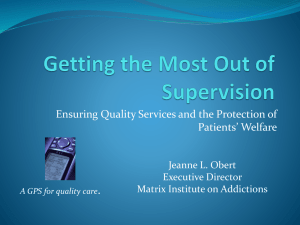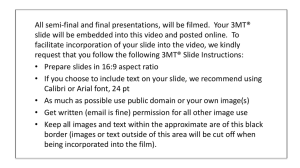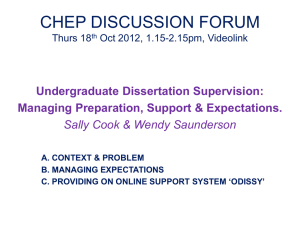accompanying Powerpoint file - CYC-Net
advertisement
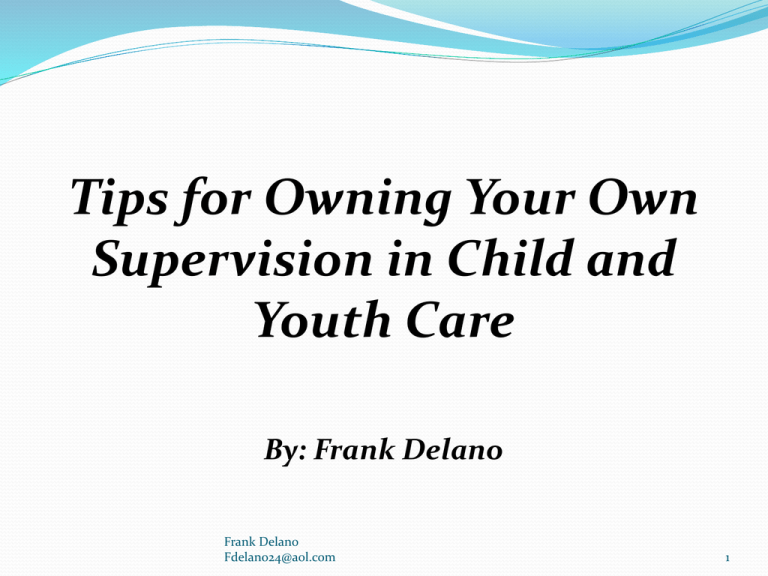
Tips for Owning Your Own Supervision in Child and Youth Care By: Frank Delano Frank Delano Fdelano24@aol.com 1 Child and Youth Care Work We deal with challenging behaviours from children We can’t always see our “successes” short term, sometimes we never see them as they may happen years later We get cursed at more than most jobs We don’t always feel the support we want from other agencies or funding sources The work raises all sorts of emotions and feelings in us The hours are often unpredictable and crazy! The community often doesn’t appreciate our work and sees us as “babysitters” The pay is LOW Frank Delano Fdelano24@aol.com 2 If I Could Supervise My Supervisor I Would... Ask them to start supervision on time and have no interruptions Ask them not to take their frustrations out on me Tell them I don’t always need an answer, sometimes I just need an ear Demand they prepare for my supervision session Empower my supervisor to take several trainings to be able to better supervise me Help them learn to be more empathic Tell them to guide, not judge Frank Delano Fdelano24@aol.com 3 If I Could Supervise My Supervisor I Would... Work part of the Holidays with me. I need support and it is hard to be away from my families Tell them to listen attentively, and with empathy Suggest they be more professional rather than just trying to be a “buddy” Ask them what the agency is supposed to be doing with the kids…if they know Point out their negative attitude is contagious Ask them to trust me more Give them a raise for putting up with me! Frank Delano Fdelano24@aol.com 4 Supervision (F. Delano and J. Shah) Supervision is a professional relationship that provides support, education, monitoring of quality, and creates a safe forum to reflect on professional practice. It should encourage constructive confrontation and critical thinking that informs and improves the practice of all parties. Respecting the inherent hierarchy in the relationship, it should accept the ethical responsibility to use power in a thoughtful manner. The dynamics in the supervisory relationship can create a parallel process in all other relationships including that of the client/worker. Ultimately, supervision should be the vehicle to create dynamic growth, establish high professional standards and enhance quality and culturally competent services. Frank Delano Fdelano24@aol.com 5 POWER Assigned authority: One party can always “pull rank” Administrative power: Lifestyle impact The “power of access”: Quality and quantity Impact on self esteem and sense of competency Expectation of supervisee to reveal more about themselves Mediates relationships and image in and outside of agency. This is REAL POWER! Power and influence doesn’t stop when the professional relationship ends Frank Delano Fdelano24@aol.com 6 “Games” Supervisees Play (F. Delano and J. Shah) The “easy button” Shopping for answers “Supervisor Tipper” I heard everyone talking…. Voice mail roulette I already told you my weakness…. You don’t understand these kids… You could look it up Frank Delano Fdelano24@aol.com 7 “Managing Your Boss” (Gabarro and Kotter) Accept it is normal for each person’s needs and styles to be different and tries to mesh them when possible. Function on mutual expectations and responsibilities…each person in this relationship significantly needs the other. Keep the supervisor informed. Remember that your supervisor is ultimately responsible for your work and also has a supervisor to report to. Frank Delano Fdelano24@aol.com 8 “Managing Your Boss” (Gabarro and Kotter) Selectively uses the supervisor’s time and resources. Keep a relationship based on honesty and dependability. It will lead to the delegation of responsibility and independence you seek in your work. It is also the basis of virtually all positive relationships in life. Frank Delano Fdelano24@aol.com 9 Confrontation (F. Delano and J. Shah) A proactive intervention to intercept and redirect behavior that may require change and To create a forum to better understand and guide the judgment/practice of both parties in order to ultimately improve quality and culturally competent service. ***Start every confrontation with “Help me understand….” Frank Delano Fdelano24@aol.com 10 The Two “Magic Questions” What information do I have that they don’t that will help them see it my way? What information do they have that I don’t that will help them see it my way? Frank Delano Fdelano24@aol.com 11 1/3, 1/3, 1/3 Agenda Model 1/3 of the agenda is the responsibility of the supervisee to prepare 1/3 of the agenda is the responsibility of the supervisor to prepare Respecting the inherent hierarchy in the relationship the supervisor retains discretion for the final 1/3 **Supervisee should hand in agenda one day In advance and consistently look to drive the final 1/3 of the agenda Frank Delano Fdelano24@aol.com 12 Sample 1/3 CYC Worker Agenda My vacation request for August Can I attend the training on better understanding trauma next week? Johnny and his mother’s visit on Sunday…what to look for Observations when I covered the overnight shift last week My frustrations with Derrick and how he behaves toward me Better understanding of the reason for the new policy on recreation trips My participation in the evening activities restructuring…ideas to give me more impact Frank Delano Fdelano24@aol.com 13 OWNING YOUR OWN SUPERVISION Ask! Ask! Ask!, and then ASK! View Supervision as a way to grow personally and professionally. “With the privilege of professional judgment comes the responsibility of reflective practice!” Seek out “supervision” anywhere you can and from anyone willing Remember to ask the two magic questions Learn and be willing to practice the art of constructive confrontation with your supervisor Bring an agenda to supervision (use the 1/3, 1/3, 1/3 model) Participate in group supervision Frank Delano Fdelano24@aol.com 14 OWNING YOUR OWN SUPERVISION Politely “insist” on a timely evaluation and use your option to respond Politely “insist” on regular supervision sessions Training! Take all you can and be seen as one who will Establish a “teaching diagnosis” of your supervisor Learn the art of “managing your boss” Be empathic with your supervisor’s issues and pressures…you may be there one day! Remember: IT’S A RELATIONSHIP Frank Delano Fdelano24@aol.com 15 Presenter Contact Information Frank Delano, LMSW Professional Package: Training for Critically Thinking Professionals (Piermont, New York, USA) fdelano24@aol.com 914-673-7802 Frank Delano Fdelano24@aol.com 16



